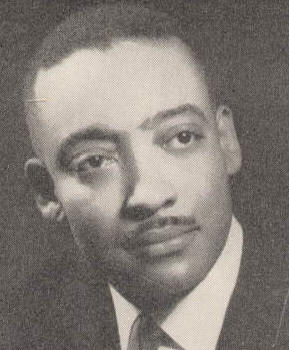Louis Lomax facts for kids
Quick facts for kids
Louis Lomax
|
|
|---|---|

Lomax in an undated photo
|
|
| Born | Louis Emanuel Lomax August 16, 1922 Valdosta, Georgia, United States |
| Died | July 30, 1970 (aged 47) Santa Rosa, New Mexico, United States |
| Occupation | Journalist, author |
| Alma mater | Paine College (1940-1942) American University (1945-1946) |
| Spouse |
Betty Frank
(m. 1958; div. 1961)Wanda Kay
(m. 1961; div. 1967)Robinette Kirk
(m. 1968–1970) |
Louis Emanuel Lomax (born August 16, 1922 – died July 30, 1970) was an important African-American journalist and writer. He made history as the first African-American television journalist.
Contents
Early Life and Education
Louis Lomax was born in Valdosta, Georgia. His parents were Emanuel C. Smith and Sarah Louise Lomax. He attended Paine College in Augusta, Georgia for two years. Later, he also studied at American University.
Lomax was married three times during his life.
A Career in Journalism
Louis Lomax started his journalism career at newspapers like the Afro-American and the Chicago Defender. These newspapers focused on news important to African-American communities.
In 1958, Lomax became the first African-American television journalist. He joined WNTA-TV in New York. This was a big step for journalism and for African Americans.
Reporting on the Nation of Islam
In 1959, Lomax worked with fellow journalist Mike Wallace. They created a five-part TV show called The Hate That Hate Produced. This show was about the Nation of Islam, a religious and political group. It was the first time many white people learned about the Nation of Islam and its leaders, Elijah Muhammad and Malcolm X.
Becoming a Freelance Writer
Lomax later became a freelance writer. This meant he wrote articles for many different magazines. His work appeared in popular publications like Harper's, Life, and The Nation.
He wrote about important topics of his time. These included the Civil Rights Movement, the Nation of Islam, and the Black Panther Party. In 1961, he won the Anisfield-Wolf Book Award for his book, The Reluctant African.
From 1964 to 1968, Lomax hosted his own television show. It aired on KTTV in Los Angeles. He also often gave talks at colleges and universities.
Supporting Civil Rights
Louis Lomax was a strong supporter of civil rights. He backed groups like the Congress of Racial Equality (CORE) and the Student Nonviolent Coordinating Committee (SNCC). He also supported the Southern Christian Leadership Conference (SCLC).
In 1968, he joined other writers and editors in a protest. They refused to pay certain taxes. This was to show their opposition to the U.S. involvement in the Vietnam War.
The Federal Bureau of Investigation (FBI) kept a file on Lomax. This file had over 150 pages of information about him.
Later Work and Death
At the time of his death, Louis Lomax was working on a big project. He was writing a three-volume series about black history.
On July 30, 1970, Lomax was traveling back to New York. He had just finished a series of talks on the West Coast. He died in a car accident on Interstate 40. This was near Santa Rosa, New Mexico.
Witnesses said he was driving fast and lost control of his car. An investigation found that Lomax was not wearing his seatbelt. He was thrown from the car when it overturned. He died from his injuries at the scene.
Some people, like writer Karl Evanzz, have suggested that Lomax's death might have been connected to his work. Evanzz wrote that Lomax was making a documentary about the FBI's role in the death of Malcolm X.
Selected Books
- The Reluctant African (1960)
- The Negro Revolt (1962)
- When the Word Is Given: A Report on Elijah Muhammad, Malcolm X, and the Black Muslim World (1963)
- Thailand: The War That Is, The War That Will Be (1967)
- To Kill a Black Man: The Shocking Parallel in the Lives of Malcolm X and Martin Luther King Jr. (1968)
 | Dorothy Vaughan |
 | Charles Henry Turner |
 | Hildrus Poindexter |
 | Henry Cecil McBay |

